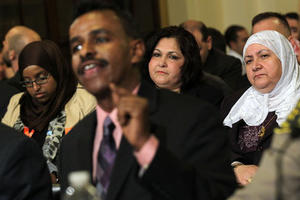Domestic terrorismMinneapolis man single-handedly battles Islamic extremism
Individuals like Abdirizak Bihi, who single handedly tries to keep young Somali-American teenagers from becoming radicalized, are part of a growing trend that officials in Washington call “CVE,” combatting violent extremism; since the 9/11 attacks, there have been fifty-one domestically produced jihadist plots or attacks in the United States and that number is steadily growing

Abdirizak Bihi testifying before the House Homeland Security Committee // Source: zimbio.com
Individuals like Abdirizak Bihi, who single handedly tries to keep young Somali-American teenagers from becoming radicalized, are part of a growing trend that officials in Washington call “CVE,” combatting violent extremism.
Since the 9/11 attacks, there have been fifty-one domestically produced jihadist plots or attacks in the United States and that number is steadily growing. In particular, Minneapolis, Minnesota has become a hotbed for domestic Muslim radicalization. Roughly 10,000 Somali immigrants live in a small section of downtown Minneapolis, and in the last three years at least twenty-five young men have headed off to Somalia to join alShabab, a radical terrorist organization, to wage Jihad. In addition dozens of others are currently under investigation for potentially fundraising and recruiting for the terrorist group.
To prevent more young adolescents in his community from becoming radicalized, Bihi launched a youth advocacy program to combat Islamic extremism. In name Bihi is the director of the Somali Education and Special Advocacy Center, but in reality he is the sole employee.
So far he has spent $20,000 in donations as well as $10,000 in savings to keep his organization afloat. He works from six in the morning until midnight so his business hours overlap with allies in Canada and Somalia. During the day, Bihi investigates leads on young adults that are rumored to have become radicalized, meets with the parents of children who have become suicide bombers in Somalia, and tries to make young Muslims feel happy and attached to their communities.
Bihi’s work began in 2008 after his nephew, a seventeen year-old honors student at a local high school, ran off with six other youths to join al Shabab in Somalia. He was killed within a year.
The FBI considers Bihi’s section of Minneapolis a “vulnerable community” as more than half of the households are headed by single mothers, 70 percent of families are impoverished, and 25 percent of adults are unemployed.
“There are a lot of people who are angry and hopeless,” Bihi said.
There has been little consensus on how to prevent youths in communities like Bihi’s from becoming radicalized. Many mosques, government officials, and local law enforcement agencies hesitate to wade into the issue fearing that focusing solely on American Muslims would be viewed negatively as racial profiling.
Even within his own community, Bihi’s efforts are considered controversial. Some have nicknamed him “Super Somali” for his devoted battle against al Shabab, while others refer to him as “ma’angag,” a Somali word that means obstinate, because they his ties to law enforcement agencies are treasonous to the Somali-American community. A local mosque has barred him from their services while another has invited him to join its leadership committee.
Meanwhile at the federal level, Democrats argue that focusing on Muslim extremism alone is discriminatory and Republicans charge that when dealing with the country’s security, there is no room for political correctness. Furthermore lawmakers on both sides are concerned that funding community based counter-radicalization programs could accidentally lead to working with extremist organizations.
In contrast Saudi Arabia funds a team of Islamic scholars who patrol Internet message boards and argue against extremist rhetoric and the British government gives $100 million each year to community-based anti-extremist programs.
In the United States, the programs are far less formalized and primarily consist of individuals or groups like Bihi. In Texas, Mohamed Elibiary, calls himself the “master of the last-ditch save” and helps law-enforcement agencies de-radicalize known extremists. Over in Dearborn, Michigan, Imad Hamad, brings local imams and FBI agents together in a series of monthly meetings. There is also the Muslim Public Affairs Council, which flies young teens out to Hollywood to teach them about the place so vilified by extremist groups.
